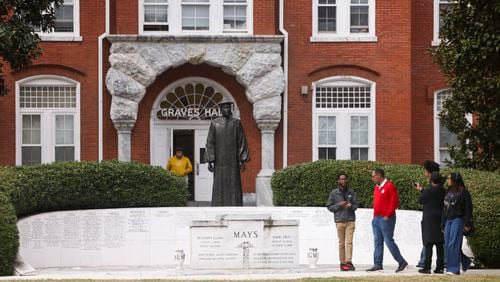Anyone questioning the pearl-beyond-price value of law enforcement should imagine accompanying a sheriff’s deputy or police officer on even the most-routine of traffic stops — especially along a desolate road at night.
That walk up to the unknowns in the vehicle ahead is a near-religious experience – one that makes plain the old cop gallows humor/advice that it’s the routine that kills you.
We’ve all driven past law officers doing just that sort of boots-on-the-ground work. If we acknowledge the blue lights at all, it might be to fleetingly entertain the thought that they’re worth whatever they’re being paid – and probably much more.
If only that were so. In truth, the reality for far too many local and county law officers in Georgia are paychecks that pitifully lag well below what should be a decent standard for this great state. Georgia’s first responders, who make more than 9 in 10 arrests here, deserve a better deal. The state Legislature, county commissioners and local governments should get to work now on making that happen in the not-distant future.
A couple of numbers can put this challenge in dollars-and-cents perspective. A good place to start is at the state level, which encompasses agencies such as the Georgia State Patrol and the Georgia Bureau of Investigation. Gov. Nathan Deal, buoyed by state revenue nicely recovering upward from the Great Recession’s trough, has folded into the state budget pay raises that average about 20 percent for state officers.
Given the risks to life itself and all-in potential for great sacrifice demanded 24/7 of those who wear the badge, the state pay hikes are an appropriate gesture conveying both society’s gratitude and the real-world recognition that law enforcement personnel deserve a decent living.
The salary increases put starting pay for a new Georgia State Trooper at $46,422 a year. That’s a decent, workable wage. Equally certain is that troopers are: a) worth every penny of that, and b) even so, they won’t grow rich while in state employ.
Pay for sheriff’s deputies and local police in the state is in a much-smaller league. The Georgia Sheriffs’ Association says pay for sheriff’s deputies averages only $29,900 statewide, which means newly graduated state troopers now join the force at a pay grade more than 55 percent higher than the average sheriff’s deputy.
If that’s not a startling enough disparity, pay for jailers and local police is even lower, with jailers averaging $25,300, and some police officers making even less.
Between its local, county and state governments, Georgia can, should and must do better by those who sign on for the dangerous work of protecting society’s good. If it takes a combined effort by all these branches of government to get there, so be it.
Legislation introduced last week provided at least somewhat of a starting point for this process. Georgia Senate Bill 254, short and sweet in length and intent, would mandate minimum pay for state sheriff’s deputies at a level equal to that of starting state troopers. That’s an admirable goal for sure, but likely not a fiscally realistic one, at least in the short-run. A more-realistic scenario is to use SB 254 as the opening gambit for a conversation conducted with a thoroughness and speed befitting the serious of the issue and a recognition of the considerable daily sacrifice of Georgia’s non-state law officers.
Getting to a workable, dollars-and-cents solution won’t be easy, given that SB 254 contains no state-level mechanism to help pay for law enforcement raises. The General Assembly needs to do much better than impose an unfunded mandate on Georgia’s counties, especially the poorest ones, the places where both tax bases and household income are at the lowest relative levels.
The Legislature, which is relatively flush with cash these days, needs to look hard at how it can put dollars of its own into the worthwhile endeavor of assisting Georgia’s first responders who risk their lives each day they report to work.
Finding a fiscal path for the state to put cash toward the badge would be in line with ongoing efforts to enhance economic prospects of poor counties and reduce the inequality between the so-called “Two Georgias.” In a sense, assisting sheriff and local police departments, at least in the poorest locations, is akin to GDOT improving rural roads or providing state tax incentives to lure businesses. There is strong, long precedent at the Gold Dome for routinely doing just that, with varying results.
Georgians have every right to expect a reasonable level of public safety that can only come in part from an adequately paid and trained network of law enforcement agencies. It’s true that no amount of pay can adequately compensate those who swear an oath to the law and put their lives in jeopardy each day as a result, but Georgia must do better by its state and local officers.
The effort to quickly do that needs to begin now.
About the Author






